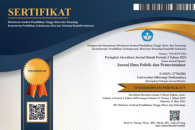Strategi Badan Pengawas Pemilu Dalam Mencegah Potensi Pelanggaran Pemasangan Alat Peraga Kampanye di Kabupaten Lombok Timur
Abstract
Keywords
Full Text:
PDF (Bahasa Indonesia)References
Bawaslu. (2020). Indeks Kerawanan Pemilu (Ikp) Pilkada Serentak 2020. Jakarta Pusat: Bawaslu.
Dedi, A. (2019, Agustus). Analisis Sistem Pemilihan Umum Serentak. Jurnal MODERAT, 5(3), 213-226.
Hasanah, I. N., & Puspitasar, C. D. (2021). Pencegahan pelanggaran pemasangan alat peraga kampanye oleh Badan. E-CIVICS - E-Journal Student UNY, 10(4), 350-363.
Herawati, Y. (2023, September 23). Bawaslu Lotim Fokus Pada Pelanggaran Pemasangan APK. Retrieved Mei 15, 2023, from Radio Republik Indonesia: https://rri.co.id/index.php/pemilu/371025/bawaslu-lotim-fokus-pada-pelanggaran-pemasangan-apk
Junaidi, V. (2009). Menata Sistem Penegakan Hukum Pemilu Demokratis Tinjauan Kewenangan MK atas. Jurnal Konstitusi, 6(3), 103-143.
Juniadi, V., & Syahda, A. (2017). Mekanisme Penanganan Pelanggaran Adminstrasi Pemilu dalam UU Nomor 7 Tahun 2017. Jurnal Bawaslu, 3(1), 49-64.
Kartini, D. S. (2017, Desember). Demokrasi dan Pengawasan Pemilu. Journal of Governance, 2(2), 146-162.
Kominfo, L. T. (2023, Maret 02). Jelang Pemilu, Pemda Tertibkan Pemasangan Baliho. Retrieved Mei 13, 2023, from Diskominfo Kabupaten Lombok Timur: https://diskominfo.lomboktimurkab.go.id/baca-berita-831-jelang-pemilu-pemda-tertibkan-pemasangan-baliho.html
Koswara, N. (2017). Implementasi Strategi Manajemen dalam Konteks Pelestarian Budaya. Kontigensi: Jurnal Ilmiah Manajemen, 5(2), 107-121.
Kurniawan, M. A., & Michael, T. (2023). Penyebaran Alat Peraga Kampanye Dengan Materi Kampanye DiluarJadwal Sebagai Pelanggaran Pemilu. INNOVATIVE: Journal Of Social Science Research, 3(6), 7716-7732.
Moleong, L. J. (2010). Metode Penelitian Kualitatif. Bandung: Metode Penelitian Kualitatif.
Neuman, W. L. (n.d.).
Neuman, W. L. (2014). Sosial Research Methods: Qualitative and Quantitative Approaches Seventh Edition. Edinburgh: Pearson Education Limited.
Palma, A. K. (2013). Mekanisme Penyelesaian Sengketa Pemilu Legislatif. Jurnal Pemilu dan Demokrasi, 6(2), 33-62.
Pangestu, A. (2022, Juni). UPAYA MEMINIMALISIR POTENSI PELANGGARAN KODE ETIK PENYELENGGARA PEMILU PADA PEMILU SERENTAK. Jurnal Bawaslu Provinsi Kepulauan Riau, 4(1), 31-44.
Penga, Q., & Yusriando. (2022, Agustus). Kajian Pembaharuan Hukum tentang Dampak Pelakasanaan Pemilu Serentak Tahun 2024. Jurnal Sosial Humaniora dan Pendidikan, 1(2), 01-07.
Sarofah, R., Purwaningsih, T., & Nurhakim. (2018, September). Analysis of Local Electoral Governance under Electoral Integrity Perspective in Yogyakarta City 2017. Journal of Government and Civil Society, 2(2), 107-125.
Subakti, R., & Supriyanto, D. (2013). Partisipasi warga negara dalam Proses Penyelenggara Pemilu. Jakarta: Kemitraan bagi Pembaruan Tata Pemerintahan.
Umar, H. (2005). Manajemen Strategi. Jakarta: Erlangga.
Wibawana, W. A. (2024, Januari 19). Pemilu Serentak: Makna, Aturan dan Jadwal Pelaksanaannya 2024. Retrieved Mei 15, 2024, from detikNews: https://news.detik.com/pemilu/d-7150281/pemilu-serentak-makna-aturan-dan-jadwal-pelaksanaannya-2024
Zulkarnaen, F., & dkk. (2020, Desember). Partisipasi Politik Pemilih Milenial pada Pemilu di Indonesia. Jurnal Politikom Indonesiana: Kajian Ilmu Pemerintahan, Ilmu Politik dan Ilmu Komunikasi, 5(2), 55-63.
DOI: https://doi.org/10.37058/jipp.v10i1.10966
Refbacks
- There are currently no refbacks.
Copyright (c) 2024 Siti Hidayatul Jumaah

This work is licensed under a Creative Commons Attribution-NonCommercial 4.0 International License.
View My Stats











